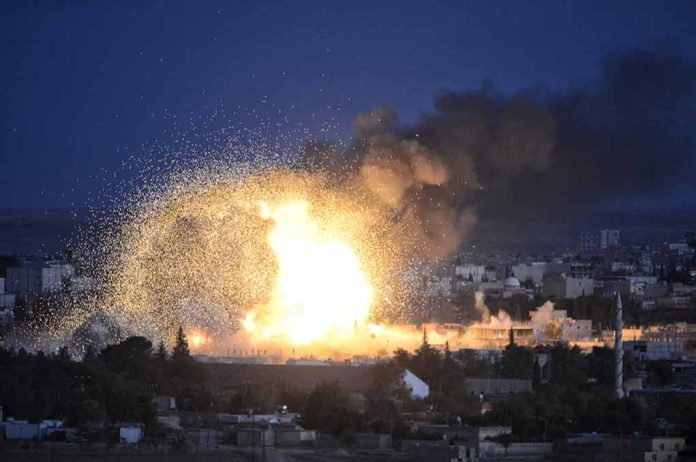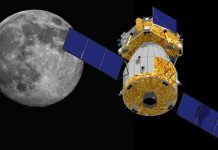
Israel launches surgical strikes on Syrian military airfields in a direct warning to Turkey as President Erdogan attempts to expand his influence in the region and reshape the Middle East power balance.
Top Takeaways
- Israel targeted Syrian military airports to prevent Turkey from interfering with Israeli operations in Syrian airspace
- Turkey’s attempts to expand military presence in Syria, including plans to deploy air defense systems at the T-4 base, triggered Israel’s response
- Turkish President Erdogan aims to position Turkey as the dominant regional power, capitalizing on power vacuums left by Russia and Iran
- The conflict raises concerns about potential escalation, with Turkey condemning the strikes while Israel warns Syria’s interim government against hosting hostile forces
- Turkey’s regional ambitions might be linked to seeking access to F-35 fighter jets from the United States
Israel’s Strategic Strikes Send Clear Message
Israel has conducted a series of significant airstrikes against Syrian military installations, specifically targeting the Hama military airport and T-4 airbase. These precision strikes damaged runways, fuel storage facilities, radar systems, and weapons caches. According to Syrian reports, the attacks caused substantial destruction at Hama airbase and resulted in casualties, with the Syrian Observatory for Human Rights documenting four defense ministry personnel killed and at least 18 separate strikes across various military assets. The timing of these operations coincides with intelligence reports indicating Turkey’s movement of jets and air defense systems to Syrian airbases.
The Syrian foreign ministry immediately condemned the attacks as “an unjustified escalation” and a violation of international law, calling for global pressure against Israel. Meanwhile, Israeli Defense Minister Israel Katz delivered an unambiguous warning to Syria’s interim President Ahmed al-Sharaa, stating that permitting hostile forces to operate from Syrian territory would result in “a very heavy price” for the regime. This direct communication underscores Israel’s determination to maintain its security interests regardless of diplomatic fallout.
Media: Israel will not allow Turkey to establish air and naval bases in Syria. If Türkiye crosses red lines, Israel will respond. pic.twitter.com/Q1YKcOABgS
— Sprinter Observer (@SprinterObserve) April 4, 2025
Turkey’s Expanding Regional Ambitions
At the core of this escalation lies Turkey’s increasingly assertive foreign policy under President Recep Tayyip Erdogan. Intelligence sources indicate Turkey is actively working to establish a significant military presence in Syria, with specific interest in utilizing the T-4 airbase for deploying air defense systems. Turkey’s Foreign Ministry swiftly condemned Israel’s strikes, accusing Israel of harboring expansionist ambitions while ironically pursuing its own regional agenda. The confrontation represents a broader strategic competition for influence in the post-Assad Syrian landscape.
“Israel’s attacks in Syria, without any provocation, are inconceivable and indicate a policy that thrives on conflict,” said Turkey’s Foreign Ministry.
Analysts suggest Erdogan’s motivations extend beyond mere territorial control. Dr. Sinan Ciddi, a regional expert, explains that the Turkish president aims to position himself as the dominant power broker in Syria to leverage this status in negotiations with the United States, particularly regarding access to advanced F-35 fighter jets. This assessment aligns with Erdogan’s pattern of using geopolitical maneuvers to advance Turkey’s military capabilities and regional standing while projecting an image of indispensability to Western allies.
Deeper Ideological Concerns for Israel
Israel’s security establishment views Turkey’s actions as representing a profound ideological threat rather than merely tactical competition. Erdogan’s increasingly antagonistic rhetoric toward Israel, including public prayers for Israel’s destruction, has heightened concerns among Israeli officials. Israeli Foreign Minister Gideon Saar bluntly assessed Turkey’s objectives, stating they are “doing their utmost to have Syria as a Turkish protectorate. It’s clear that is their intention.”
Former U.S. Ambassador Eric Edelman has called for diplomatic intervention to address Turkey’s inflammatory rhetoric, suggesting that “quiet discussions with Turkey about toning down the rhetoric about Israel” should precede any consideration of renewed F-35 sales. The situation is further complicated by Erdogan’s domestic challenges, including rising public protests against his regime, which some analysts interpret as signs of desperation rather than strength. As Turkey experiences internal pressure, Erdogan may increasingly look to foreign policy achievements to bolster his position at home.
Regional Security Implications
The escalating confrontation between Israel and Turkey, who is a NATO member, over Syrian territory raises significant concerns about U.S. commitments and broader regional stability. Israeli forces have expanded their operations beyond airstrikes, conducting ground operations in Syria’s Deraa province that reportedly resulted in nine militant casualties and weapons seizures. These multifaceted military actions highlight Israel’s willingness to address perceived security threats through both air and ground operations when deemed necessary for national defense, regardless of international criticism.
Security experts warn that Syria risks becoming a battleground for competing regional powers in the aftermath of the Assad regime’s collapse, potentially triggering wider conflict. Turkey’s defense pact with Syria’s transitional government provides a legal framework for its military presence, while Israel maintains its longstanding policy of preventing adversaries from establishing threatening positions near its borders. With both nations pursuing incompatible security objectives in Syria, and both possessing significant military capabilities, the risk of miscalculation leading to direct confrontation between these American allies continues to grow.






















